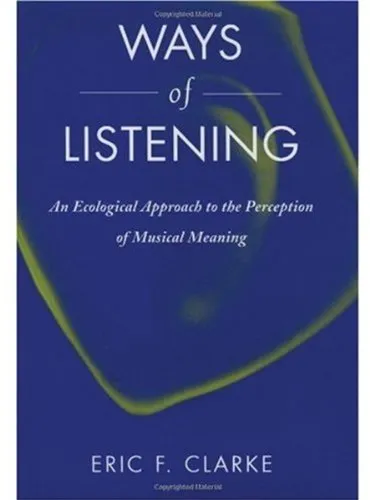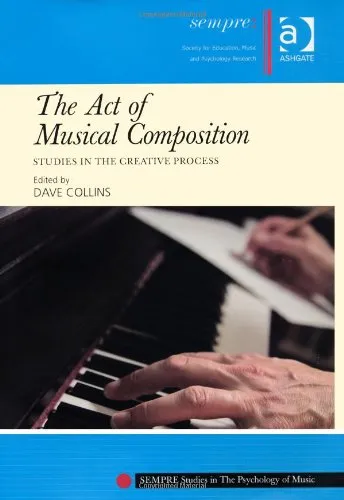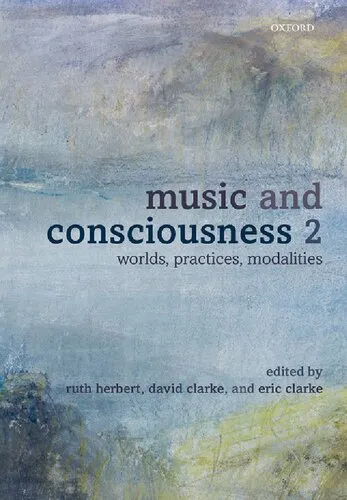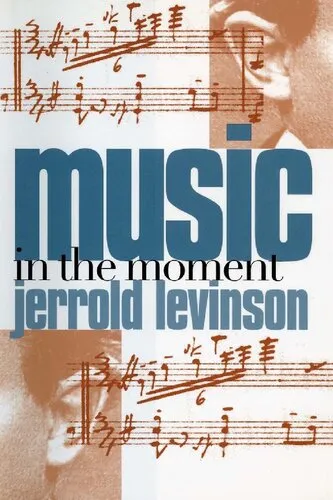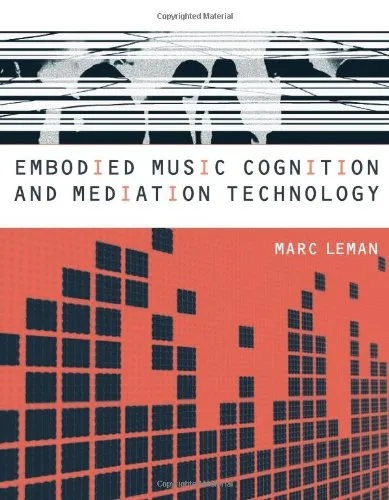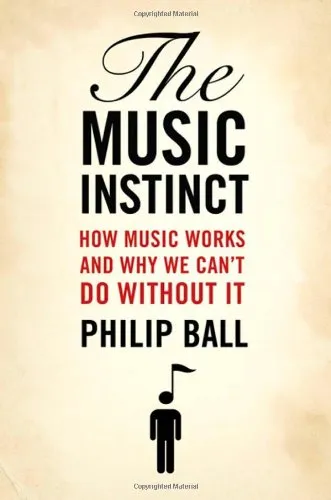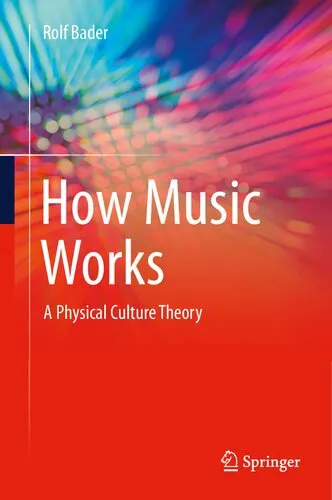Ways of Listening: An Ecological Approach to the Perception of Musical Meaning
4.0
بر اساس نظر کاربران

شما میتونید سوالاتتون در باره کتاب رو از هوش مصنوعیش بعد از ورود بپرسید
هر دانلود یا پرسش از هوش مصنوعی 2 امتیاز لازم دارد، برای بدست آوردن امتیاز رایگان، به صفحه ی راهنمای امتیازات سر بزنید و یک سری کار ارزشمند انجام بدینکتاب های مرتبط:
مقدمه
کتاب Ways of Listening: An Ecological Approach to the Perception of Musical Meaning اثری برجسته از من، اریک اف. کلارک، است که به بررسی یکی از پیچیدهترین و جالبترین جنبههای تجربه انسانی، یعنی درک موسیقی، میپردازد. این کتاب با استفاده از رویکرد Ecological به موضوع، فهم جدیدی از نحوه تعامل ما با صدای موسیقی و معنای تولیدشده از آن ارائه میدهد. هدف اصلی این کتاب آن است که نشان دهد چگونه شنوندگان در فضاهای مختلف زمانی و فرهنگی، بهطور غیرمستقیم در درک عمیقتر و معنادارتر موسیقی مشارکت میکنند.
خلاصهای از کتاب
کتاب Ways of Listening از دیدگاههای علمی و فلسفی به موضوع موسیقی نگاه میکند. بخشهای مختلف این اثر، شنیدن موسیقی را به عنوان فرآیندی پیچیده اما طبیعی ترسیم میکند که از تعامل میان محیط، بدن و ذهن شکل میگیرد. من در این کتاب نظریهای ارائه میکنم که معتقد است فرایند شنیدن موسیقی دقیقاً در مکالمهای بیوقفه میان انسانها و محیط صوتیشان رخ میدهد. برخلاف رویکردهای سنتی که موسیقی را تنها به عنوان پدیدهای انتزاعی بررسی میکنند، این اثر موسیقی را بهعنوان فعالیتی مرتبط با سازگاریهای انسانی مورد مطالعه قرار میدهد.
این کتاب دارای سه بخش اصلی است: نخست، معرفی رویکرد Ecological به فهم ادراک؛ دوم، بررسی این رویکرد در مورد موسیقی؛ و سوم، بررسی معنا و درک موسیقی در زمینههای اجتماعی و فرهنگی. هر فصل بهنوبه خود مفاهیمی کلیدی چون "شنیدن حمایتی" و "درک بدنی موسیقی" را برجسته میسازد و نشان میدهد چگونه موسیقی بهطور ناگسیسته با زمینههای مختلف زندگی در ارتباط است.
نکات کلیدی
- رویکردی متفاوت به درک موسیقی و ارتباط آن با محیط.
- تاکید بر نقش شنونده در تولید معنا از موسیقی.
- تحلیل انتقادی از مدلهای سنتی شناخت موسیقی.
- بررسی تعامل میان بدن، ذهن، و محیط در تجربه شنیداری.
- پیشنهاد مفاهیمی جدید مانند "Ecological Listening" و "Embodiment".
جملات معروف از کتاب
“Listening is not just a passive reception of sound but an active engagement with the world of music.”
“The meaning of music arises not solely from the composition, but from the dynamic interaction between the listener, the sound, and the surrounding environment.”
“Music exists in the space between abstraction and bodily experience.”
چرا این کتاب مهم است؟
کتاب Ways of Listening برای افرادی که به درک عمیقتر موسیقی، هنر و حس شنیداری خود علاقهمندند، یک منبع بسیار ارزشمند است. این اثر نهتنها به محققان موسیقیشناسی بلکه به کسانی که به شناخت ارتباط میان بدن، محیط و تجربه انسانی علاقه دارند، پیشنهاد میشود. اهمیت این کتاب بهویژه در نحوه تجزیه و تحلیل اصوات و موسیقی از دیدگاه Ecological است که به فهم بیشتر تعامل بین فرد و جهان صوتی پیرامونش کمک میکند.
این اثر همچنین به چگونگی تجسم موسیقی در فرآیندهای فرهنگی و اجتماعی میپردازد و همین امر آن را از دیگر کتب مرتبط متمایز میکند. خواندن این کتاب میتواند دیدگاههای جدیدی در مورد نحوه مواجهه با موسیقی و درک معنای آن در محیطهای مختلف ایجاد کند.
Introduction to "Ways of Listening: An Ecological Approach to the Perception of Musical Meaning"
"Ways of Listening: An Ecological Approach to the Perception of Musical Meaning" by Eric F. Clarke offers a groundbreaking perspective on how humans perceive and interact with music. This book redefines traditional approaches to music perception by integrating ecological principles, grounding musical meaning in the listener's embodied experiences and environment. It straddles the boundaries between musicology, psychology, philosophy, and cognitive science, making it an essential text for anyone seeking a deeper understanding of how music resonates with us on a profound level.
Departing from purely formalist or culturally relativistic approaches, Clarke introduces the notion that music perception is an active and dynamic process shaped by the interplay between the listener, the music, and the context within which this interaction occurs. Through this lens, music is not merely an abstract art form confined to theoretical structures but a vibrant, lived experience rooted in human action and purpose. This book presents a compelling argument to rethink what it means to listen, analyze, and derive meaning from music.
Detailed Summary of the Book
The book is organized into several chapters, each of which expands on key concepts of ecological psychology and their relevance to music perception. Clarke draws inspiration from the ecological approach of J.J. Gibson, emphasizing the relationship between perception, action, and environment. He argues that musical meaning arises from a listener's engagement with the environment and the music's affordances—opportunities provided by music for particular actions or experiences.
In the early chapters, Clarke outlines the historical context of music perception theories, revealing the limitations of both abstract formalist and sociocultural approaches. Instead, he advocates for perceiving music as an experiential phenomenon. He then delves deeply into how listeners actively shape their experiences, responding not just to the sounds but also to memories, expectations, and emotions.
Later chapters focus on how context—whether social, cultural, or physical—affects how music is experienced and interpreted. Clarke explores diverse scenarios, from live performances in concert halls to solitary listening via headphones, and demonstrates how these differing contexts influence the listener's perception of musical meaning.
By integrating examples from classical, jazz, popular, and experimental music, Clarke builds a richly detailed argument in favor of adopting an ecological perspective. His exploration includes vivid case studies and empirical data that showcase the symbiotic relationship between musical structures, environmental stimuli, and human interpretation. In doing so, he provides compelling evidence for his ecological framework as a holistic approach to understanding the nature of music perception.
Key Takeaways
- Music perception is an active interaction between the listener, the sounds, and the environment.
- Musical meaning emerges from the affordances offered by the music within specific contexts.
- Listeners' prior experiences, emotions, and cultural understanding play a critical role in how they interpret music.
- The ecological approach challenges traditional formalist and relativist frameworks, offering a fresh and integrative way of exploring music perception.
Famous Quotes from the Book
"Music, in its essence, is not a thing but an event—a moment of lived experience profoundly shaped by the world in which it occurs."
"Listening is not a passive act but an act of discovery, shaped by the encounter between sound and perception."
"The meaning of music is as much in the ear of the listener as it is in the notes themselves."
Why This Book Matters
"Ways of Listening" is a pivotal piece of scholarship because it bridges gaps between disciplines while tackling a subject central to human culture: music. By adopting an ecological framework, Clarke challenges and expands traditional methodologies in musicology and cognitive science alike. His ideas inspire readers not only to understand music differently but also to approach listening itself as a transformative practice.
This book is essential for students, researchers, and practitioners from diverse fields such as music theory, psychology, and philosophy. It provides tools to approach the intricacies of musical meaning while emphasizing the individual's active role in shaping their musical experiences.
Ultimately, Clarke prompts us to reflect on the deep connections between sound, emotion, and the environments we inhabit. He reminds us that music is not just a product to be consumed, but an event that can influence and reflect our lived realities. Whether you're a musician, a scholar, or simply a curious listener, "Ways of Listening" challenges you to expand your understanding of what music means—and why it matters.
دانلود رایگان مستقیم
شما میتونید سوالاتتون در باره کتاب رو از هوش مصنوعیش بعد از ورود بپرسید
دسترسی به کتابها از طریق پلتفرمهای قانونی و کتابخانههای عمومی نه تنها از حقوق نویسندگان و ناشران حمایت میکند، بلکه به پایداری فرهنگ کتابخوانی نیز کمک میرساند. پیش از دانلود، لحظهای به بررسی این گزینهها فکر کنید.
این کتاب رو در پلتفرم های دیگه ببینید
WorldCat به شما کمک میکنه تا کتاب ها رو در کتابخانه های سراسر دنیا پیدا کنید
امتیازها، نظرات تخصصی و صحبت ها درباره کتاب را در Goodreads ببینید
کتابهای کمیاب یا دست دوم را در AbeBooks پیدا کنید و بخرید
1431
بازدید4.0
امتیاز0
نظر98%
رضایتنظرات:
4.0
بر اساس 0 نظر کاربران
Questions & Answers
Ask questions about this book or help others by answering
No questions yet. Be the first to ask!
